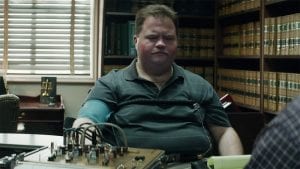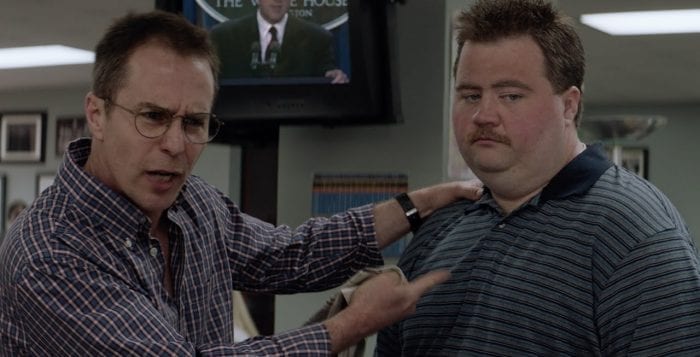By Jeffrey Sanzel
Security guard Richard Jewell was working the 1996 Atlanta Olympics, at Centennial Olympic Park. On July 27, he spotted a backpack underneath a bench and called in the suspicious package. One of three pipe bombs in the bag went off, causing two deaths and hundreds of injuries. But it was Jewell’s quick thinking that saved thousands of lives. Immediately, Jewell was thrust into the spotlight. These accolades were short-lived as he went from hero to suspect. On July 30, 1996, the Atlanta Journal-Constitution identified Richard Jewell as the FBI’s prime suspect. What ensued was a nightmare for Jewell, an innocent man.
The film Richard Jewell is based on Marie Brenner’s February 1997 Vanity Fair article “American Nightmare: The Ballad of Richard Jewell” and the book The Suspect: An Olympic Bombing, the FBI, the Media, and Richard Jewell, the Man Caught in the Middle (2019), by Kent Alexander and Kevin Salwen. Directed by Clint Eastwood, with a screenplay by Billy Ray, the film is a scathing indictment of the FBI and the media.

The movie opens with a brief prologue setting up Jewell as a college rent-a-cop. Jewell is a sad-sack of a man with the sole ambition of working in law enforcement, who has a hard time finding the line between spirit and letter. In many ways, this desire adds to his later persecution.
The film then jumps to the day before the bombing and follows Jewell through that horrifying event. What follows is his brief shining moments and then the relentless pursuit by government and media.
Jewell engages a lawyer whom he knew years before, a maverick named Watson Bryant. Bryant takes over the case and attempts to control Jewell’s statements to the FBI but is constantly checking Jewell’s desire to be seen as one of them. There are many statements about Jewell fitting a particular profile. These are revealed to be skewed − ungrounded in select and selected facts. Eventually, the FBI is not able to make its case, and he is exonerated, but the damage is done.
It is a dark story that takes its time. With the exception of the bombing itself, the film focuses on one man’s victimization by a system he doesn’t fully understand. There are multiple scenes of interrogation and violation of his privacy. There is not a great deal of action, but the driving force is the knowledge that he is innocent.
Richard Jewell contains three truly excellent performances. The always strong Sam Rockwell is engaging as the wry lawyer, finding variety and nuance in every look and sigh as he marvels with exasperation at his client’s naivete. Kathy Bates finds dimension as Jewell’s mother, Bobi. In what could play into every stereotype, she mines the role for both love and frustration with her son.
At the center of the film is Paul Walter Hauser as Richard Jewell. A large, lumbering figure, he exudes a desperation that reflects his own need to be accepted by a world that has very little use for him. It is a heart-breaking performance, and Hauser presents a fully realized man. Rather than a caricature of a gun-owning mama’s boy, Hauser’s Jewell is a man who loves his mother and whose only goal in life is to protect.
Jon Hamm, as the stone-faced FBI agent Tom Shaw, does little but alternate between grimacing and glowering. Olivia Wilde is given the unenviable job of portraying the reporter from the Atlanta Journal-Constitution, Kathy Scruggs, who first wrote about Jewell being a person of interest. The film has garnered controversy over its portrayal of Scruggs, who is shown offering sex to Shaw in exchange for information. This is an entirely fictious creation with no grounding in fact. The real-life Scruggs was a fascinating person, of great depth, and is given short shrift.
This is not the only place where the film has taken liberties with swaths of the truth. If the Vanity Fair source is to be trusted, there are perhaps too many pieces that have been fictionalized for narrative purposes. In a film that is calling into question the power of the press, one must then ask if it is not equally as dangerous to present a flawed reflection of an historical event.
Ultimately, Richard Jewell is a film with a trio of great performances and strong, simmering storytelling. And, in its own way, it is a cautionary reminder of the power and responsibility of government and media.





